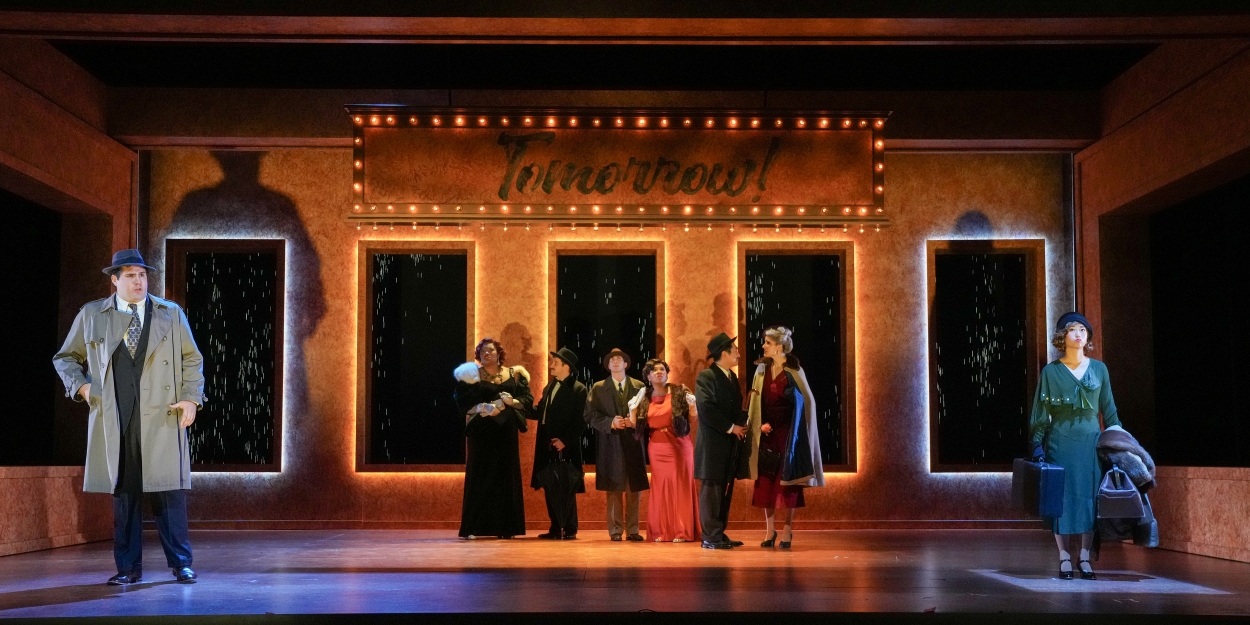Review: Edward Hopper Paintings Inspire LATER THE SAME EVENING by John Musto and Mark Campbell at Juilliard Opera
Tales of Loneliness, Directed by Alison Moritz and Conducted by Joseph Colaneri

It’s amazing how much emotion John Musto and Mark Campbell have been able to cram in the mere 75 minutes of LATER THE SAME EVENING, a one act opera, which has been on view this past week at Juilliard Opera at the Peter Jay Sharp Theatre, on West 65 Street, down the block from Lincoln Center’s Alice Tully Hall.
But then they were inspired by five quintessentially realist works by artist Edward Hopper—that master of packing maximum sentiment into the simplest-looking scenes, easily capturing the loneliness of his subjects. Even when there was more than a single character that he painted in a tableau, they were more “alone-together” rather than simply by themselves.
Musto and Campbell were able to capture the nuances of these characters’ lives in their keenly wrought score, as when it was being more lighthearted, e.g., during the Broadway show (“Tell Me Tomorrow”) that is one of the threads that ties the action together.
Musto’s music, played winningly by the Juilliard Orchestra under Joseph Colaneri from the Glimmerglass Festival, was varied in style and texture from one moment to the next, whether jazzy or Broadway-style, off-kilter discordant or dreamy, always managing to capture the irritations of daily life accurately. It fit beautifully with Campbell’s stylish libretto, which picks up on the frustrations of the characters on one hand but then quickly turns witty and bright when needed.
Campbell managed to create breathing people from the most modest of clues provided by the artist and brought together their untold stories into a single line: Whether it is a married couple (Elaine and Gus) frustrated that they are not on the same wavelength, or a theatre usher (Thelma) who’s not much interested in the patrons she’s in contact with, or a widow (Estelle) meeting up with someone (Ronaldo) she doesn’t think is right for her or a failed performer (Ruth) going back home and writing a ‘Dear John’ letter to her boyfriend (Joe). There are even people that wandered in from elsewhere (Jimmy, Rose and Sheldon, Valentina), to help fill out the stories of those who came directly from Hopper’s paintings.
This resulted in juicy roles—"finely etched character studies,” more specifically—that delve into the interior lives of the people who inhabit the opera.
The cast was uniformly strong, dressed well with Olivera Gjic’s classic period costumes. In particular, there was soprano Jazmine Saunders (Elaine), whose big voice confirmed the fine impression she recently made at Joyce DiDonato’s master class at Carnegie Hall, including her scenes with bass-baritone Jared Werlein (as disinterested husband Gus). Sweet-voiced soprano Song Hee Lee did very well with the non-English-speaking role of Valentina, a foreigner who can’t quite relate to the show she’s bought a ticket for, adding a comic thrust to the action.
I also like the youthful, smooth tenor Colin Aikins’ Jimmy (one of the non-Hopper roles) as the out-of-towner who buys Gus’s theatre seat from Elaine. Lizzy Hayes was strong in the multi-faceted role of Thelma, the feisty theatre-usher-turned-bereft-single-woman-at-the-automat, who seems to have a chance for a happy ending with Joe (the warm baritone Trevor Haumschilt-Rocha).
Soprano Gemma Nha was quintessentially Hopper-esque and sounded lovely as Ruth, the failed dancer who has jilted Joe. Baritone Minki Hong and mezzo Lucy Joy Altus (as Ronaldo and Estelle) played and sounded well together, as did tenor Samuel Rosner and soprano Jasmin Ward (as the bickering Sheldon and Rose).
The production, designed by Lawrence Moten III with Kate Ashton’s lighting, was directed by Alison Moritz, who is “committed to contemporary opera.” Yet I was somewhat puzzled that Brian Zeger, Artistic Director of the school’s Ellen and James S. Marcus Institute for Vocal Arts, in his program notes, talks about how the creators used Hopper’s paintings’ “still, silent and meditative” images, while this particular production chose not to show the art except in the program—where it was easy to miss. The director put in some touches—doppelgangers for some of the major characters—that were not part of the original piece and didn’t seem to do much to move the action forward.
Juilliard’s production had its first performance on Sunday afternoon, with the next performance on November 17 at 7:30. For more information, see Juilliard's website.
Photo: Richard Termine/Juilliard Opera
Reader Reviews

Videos


